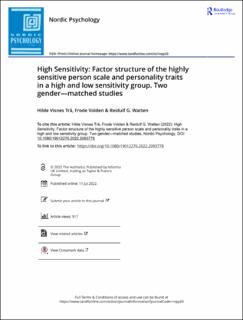High Sensitivity: Factor structure of the highly sensitive person scale and personality traits in a high and low sensitivity group. Two gender—matched studies
Peer reviewed, Journal article
Published version
Permanent lenke
https://hdl.handle.net/11250/3028318Utgivelsesdato
2022Metadata
Vis full innførselSamlinger
Originalversjon
10.1080/19012276.2022.2093778Sammendrag
Sensory Processing Sensitivity (SPS) is a heritable personality related trait which includes sensitivity to a variety of stimuli, emotional, cognitive, and behavioural reactions such as strong positive and negative emotional responses, deep cognitive processing of stimuli, and empathic behaviour. Two studies are reported. Study 1 investigated the factor structure of the Highly Sensitive Person scale (HSP) and gender differences in HSP. Study 2 described differences in Big Five personality traits between two HSP groups. Study 1 comprised a sample of adults, mostly university students, matched on gender (N men = 548, N women = 548; total N = 1096). Study 2 was based on a sample consisting of a High (N = 164) and Low (N = 164) HSP group also matched on gender (N men = 82 and N women = 82 in both groups; total N = 328). There were no age differences between men and women in the two samples. Results from Study 1 showed a correlated three-factor solution: The first factor reflected excitability, easily aroused, negative emotional reactivity, frustration, avoidance of upsetting situations and childhood shyness. Factor 2 comprised low sensory threshold and sensory discomfort. Factor 3 captured intensity of aesthetic reactions, preoccupation with details in the environment, and socio-emotional sensitivity. Gender differences were found, women had elevated HSP scores on all scales, also when controlled for personality traits. Study 2 showed that the highly sensitive individuals had a unique personality trait profile compared to low sensitives. They had higher scores on neuroticism, agreeableness, openness, and lower scores on conscientiousness. There were no differences in extraversion i.e., there was no tendency towards introversion among the high sensitives.
Tidsskrift
Nordic Psychology
Med mindre annet er angitt, så er denne innførselen lisensiert som Attribution-NonCommercial-NoDerivatives 4.0 Internasjonal
Beslektede innførsler
Viser innførsler beslektet ved tittel, forfatter og emneord.
-
Antropologisk forskning i sensitive felt: retningslinjer til besvær
Rysst, Mari (Peer reviewed; Journal article, 2020)Denne artikkelen handler om tre metodologiske utfordringer knyttet til anonymisering, samtykke og detalj planlagte feltarbeid. Antropologisk forskning er en hermeneutisk, fenomenologisk forskningstradisjon som vektlegger ... -
Behavioural Responses to Thermal Conditions Affect Seasonal Mass Change in a Heat-Sensitive Northern Ungulate
van Beest, Floris M.; Milner, Jos (Journal article; Peer reviewed, 2013)Background Empirical tests that link temperature-mediated changes in behaviour (activity and resource selection) to individual fitness or condition are currently lacking for endotherms yet may be critical to understanding ... -
Price sensitivity in the clinical testing market for Extended-Spectrum Beta-Lactamase
Shah, Ajay Kumar (Master thesis, 2019)This thesis studies the potential for using molecular testing for ESBL in Norwegian hospitals. Background material was obtained by checking the prices of existing kits, doing an interview with one of Norway’s foremost ...

